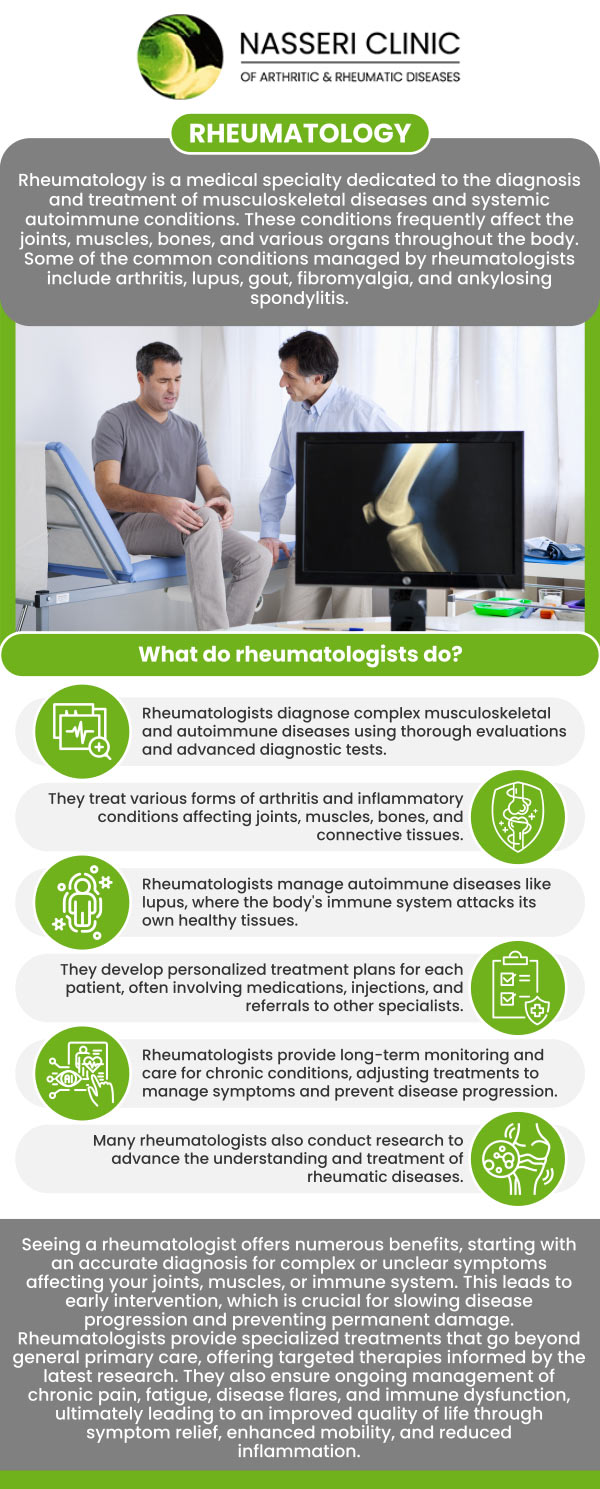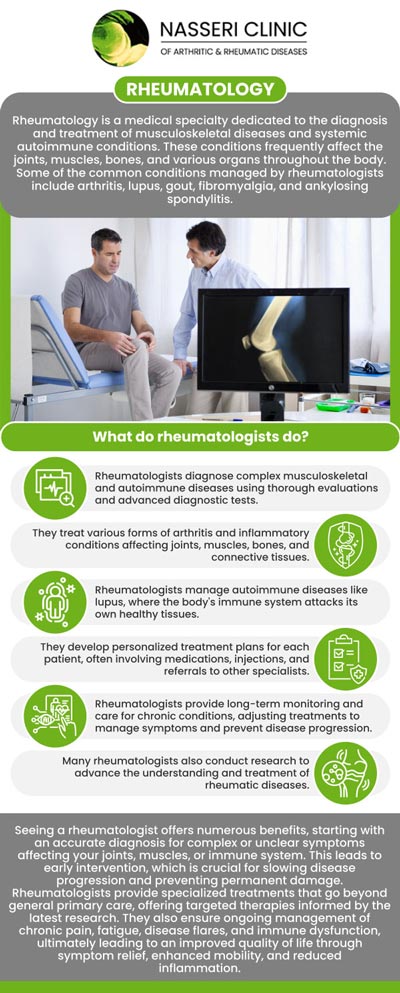What to Expect from the First Rheumatologist Appointment?
Visiting a rheumatologist for the first time can be a key step in managing joint pain or autoimmune conditions. During your appointment, our specialists will review your medical history, conduct a physical exam, and may order tests to better understand your symptoms. For more information, contact us or request an appointment online. We have convenient locations in Catonsville, Glen Burnie, Columbia, Rosedale, Edgewater, North Baltimore, MD.




Table of Contents:
What should I bring to my first rheumatologist appointment?
How long does a typical first rheumatology visit last?
What kinds of questions will the rheumatologist ask during the first appointment?
Will I need any lab tests or imaging during my first visit?
At Nasseri Clinic of Arthritic and Rheumatic Diseases, we aim to provide personalized care for arthritis and rheumatic conditions. To make the most of your first rheumatology appointment, please bring the following:
• Medical History
Gather details about past diagnoses, treatments, surgeries, and any relevant medical events. If possible, bring medical records from your primary care physician or specialists.
• Medication List
Bring a list of all medications, supplements, vitamins, and herbal products with their dosages and usage frequency.
• Imaging and Lab Results
If you have recent imaging (X-rays, MRIs, etc.) or lab results, please bring copies or arrange for them to be sent to us.
• Symptom Diary
Track your symptoms, including when they started, their frequency, intensity, triggers, and how they impact daily activities.
• Questions and Concerns
Write down any questions or concerns to ensure you cover all important topics during your visit.
• Support Person
Bring a family member or friend for emotional support and assistance in remembering important details.
Preparing these items helps our specialists gain a complete understanding of your health, leading to a more productive consultation and personalized treatment plan.
At Nasseri Clinic of Arthritic and Rheumatic Diseases, we prioritize thorough, personalized patient care from the very first visit. Your initial rheumatology appointment at our clinic allows our specialists ample time to conduct a comprehensive assessment. During this initial consultation, your rheumatologist will review your medical history in detail, discuss your current symptoms, carry out a careful physical examination, and evaluate any previous medical records or test results you provide. This structured, comprehensive approach enables our specialists to gain an in-depth understanding of your condition, thoroughly answer your questions, and discuss potential diagnoses and individualized treatment options.
Follow-up appointments at Nasseri Clinic are generally shorter, as these sessions focus on monitoring your progress, adjusting your treatment plan as needed, and addressing any new questions or concerns you may have.
During your initial visit, our rheumatology specialist will dedicate ample time to thoroughly discuss your symptoms, overall health, and detailed medical history. At Nasseri Clinic, we understand that each patient’s experience with rheumatic and arthritic conditions is unique, and we are committed to providing personalized and compassionate care.
During your consultation, you can expect your rheumatologist to ask about the specific nature and duration of your symptoms, including joint pain, swelling, stiffness, fatigue, and any skin changes. They will inquire about which joints or body areas are affected, the intensity and frequency of your discomfort, and if certain factors or activities worsen or alleviate your symptoms.
Your rheumatologist will carefully explore the timeline of your condition, including when symptoms first appeared, their progression, and whether they vary throughout the day—for example, experiencing morning stiffness or increased pain following activity.
Additionally, it’s beneficial to discuss any previous medical conditions, chronic illnesses, surgeries, or hospitalizations you have had. Our specialist will also review any prior consultations you may have had with other healthcare providers regarding your rheumatic issues, including diagnostic tests performed and treatments previously prescribed. It’s important to share information about all current medications you are taking, such as prescription drugs, over-the-counter medications, dietary supplements, or herbal products.
Family medical history is another critical component of your assessment, as certain arthritic and rheumatic conditions have genetic links. Your rheumatologist will ask if any immediate or extended family members have been diagnosed with arthritis, autoimmune disorders, or other rheumatic diseases.
At Nasseri Clinic, we also take into consideration lifestyle and environmental factors that may impact your condition. Questions about your occupation, exercise habits, diet, smoking status, alcohol use, and stress levels help us gain a clearer understanding of factors contributing to your symptoms.
Finally, we believe in a holistic approach to care, and your rheumatologist will discuss with you how your symptoms affect your daily activities, work responsibilities, hobbies, and personal relationships. Open, honest communication is key to helping our team accurately diagnose your condition and create a customized treatment plan designed specifically to improve your quality of life.
During your initial visit, your rheumatology specialist will perform a comprehensive medical evaluation specifically tailored to your joint and rheumatic health concerns. This detailed evaluation includes reviewing your medical history, discussing your symptoms, and conducting a thorough physical examination focused on identifying signs of arthritis, autoimmune conditions, or other rheumatic disorders.
Depending on your individual symptoms and risk factors identified during this assessment, your rheumatologist may recommend specific diagnostic laboratory tests or imaging studies to help clarify your condition and guide treatment options. Common laboratory tests performed in our clinic often include blood tests that evaluate for inflammatory markers, autoimmune antibodies, and indicators of rheumatic diseases such as rheumatoid arthritis or lupus.
It’s important to note that not every initial consultation will require laboratory or imaging studies. Your rheumatologist will thoroughly explain the necessity and purpose of any recommended testing and address any questions or concerns you may have, ensuring you feel informed and comfortable about your personalized care plan at Nasseri Clinic of Arthritic and Rheumatic Diseases. For more information, contact us or book an appointment online. We have convenient locations to serve you in Maryland. We serve patients from Catonsville MD, Glen Burnie MD, Columbia MD, North Baltimore MD, Rosedale MD, Edgewater MD, Hebbville MD, Woodlawn MD, Pasadena MD, Jacobsville MD, Ellicott City MD, Laurel MD, Dundalk MD, Halethorpe MD, Overlea MD, Parkville MD, Riva MD, Annapolis MD, Ferndale MD, and surrounding areas.
Check Out Our 5 Star Reviews


Additional Services You May Need

Additional Services You May Need
▸ Arthritis Care
▸ Infusion Therapy
▸ Lab Services
▸ Radiology
▸ NCARD NRACE
▸ BioFlex Laser Therapy
▸ Ultrasound Guided Injection
▸ NCARD PRP
▸ NCARD Myers
▸ Rheumatology
▸ Myositis
▸ Osteoporosis
▸ Ulcerative Colitis
▸ Multiple Sclerosis
▸ Saphnelo Infusion
▸ Injection Treatments
▸ Intravenous Immunoglobulin Therapy
▸ Asthma
▸ Crohn’s Disease
▸ Fibromyalgia
▸ Infusion Therapy for Gout
▸ Inflammatory Eye Disease
▸ Inflammatory Skin Disease
▸ Vasculitis
▸ Iron Deficiency
▸ Lupus


